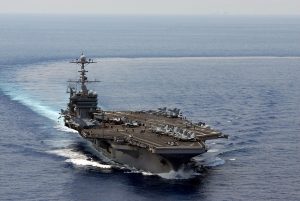Contrary to the idea of “a new type of great power relationship” defined by mutual respect, mutual benefit, and win-win cooperation proposed by Chinese President Xi Jinping, China and the United States have been recently engaged in a war game over the South China Sea.
In response to China’s active construction of islands in the disputed waters of the South China Sea, a U.S. Navy P-8A Poseidon surveillance plane flew near the construction site on Fiery Cross Reef in the Spratly Islands on May 21, 2015 and received eight warnings from a Chinese military dispatcher. This incident came less than a week after a U.S. warship sailed through the Spratly Islands.
From China’s point of view, the construction work in the South China Sea is lawful, necessary, and on its own territory. As Foreign Minister Wang Yi stated in March 2015, China is merely building facilities in its own yard. “We have every right to do things that are lawful and justified,” he said.
From the United States’ perspective, however, China’s construction work poses threats not only to its immediate neighbors such as Vietnam and the Philippines — a U.S. treaty ally — but also to the freedom of navigation in the South China Sea — one of the world’s busiest shipping routes. In Washington’s view, a robust response is urgently needed.
In this game of chicken, neither side will back down easily. As an emerging global power, China has to show its strength and determination to be able to defend its own “core interests.” In his most recent meeting with U.S. Secretary of State John Kerry, Foreign Minister Wang emphasized that “the determination of the Chinese side to safeguard our own sovereignty and territorial integrity is as firm as a rock and it is unshakeable.” But the United States, keen to maintain its status as world leader, is just as determined to demonstrate its credibility as the world police.
Clearly, the United States does not want to go to war with China. Nor does China intend to get into a military conflict with the United States. The U.S. just wants China to recognize its leadership in the international arena.
But it is in the interest of the United States to create some degree of tension over the South China Sea, mainly for three reasons. First, the success of President Barack Obama’s rebalancing strategy depends on the ability of the United States to keep the attention of its allies and other concerned parties on the issue of security — and away from purely economic and trade issues. Escalated tensions in the South China Sea help achieve that goal.
Second, China’s appeal as an alternative world leader has drastically increased along with its megaprojects such as the “one belt, one road” strategy and the Asian Infrastructure Investment Bank (AIIB). Drawing attention to China’s provocative moves in the South China Sea is an effective way of deflating that appeal.
Third, for the United States, this is a cost-effective way to “engage” China. Sending a few warships and surveillance planes to the vicinity of China’s territories makes China nervous but does not cost much on the part of the United States.
It is not in China’s interest to have military conflicts with the United States over the South China Sea. But China will feel pressured to respond to U.S. actions and the cycle of action-reaction may very well spiral out of control.































